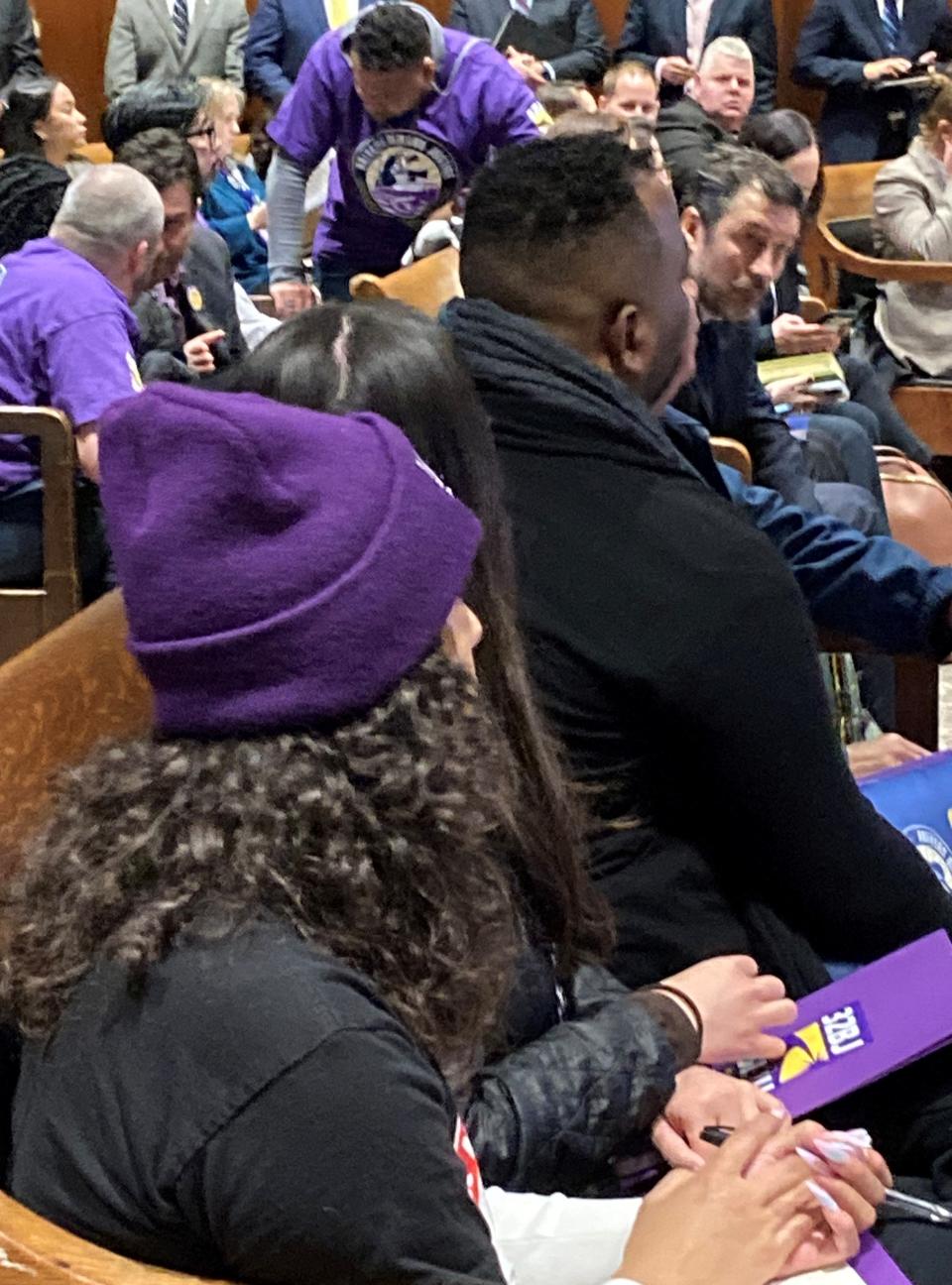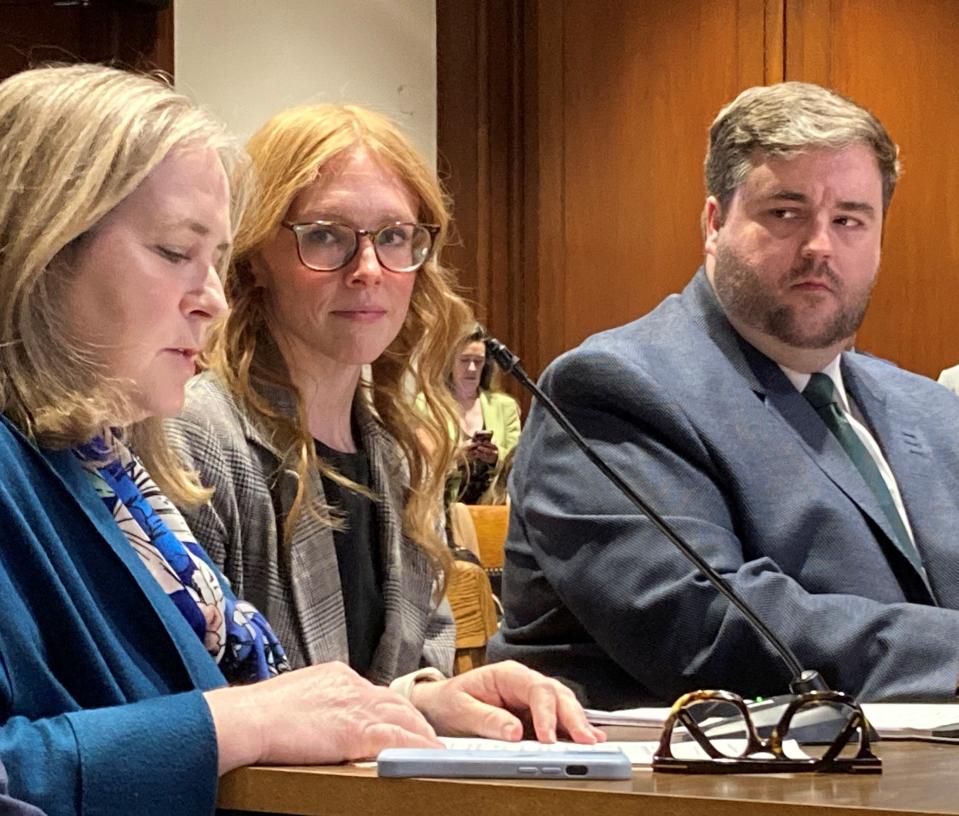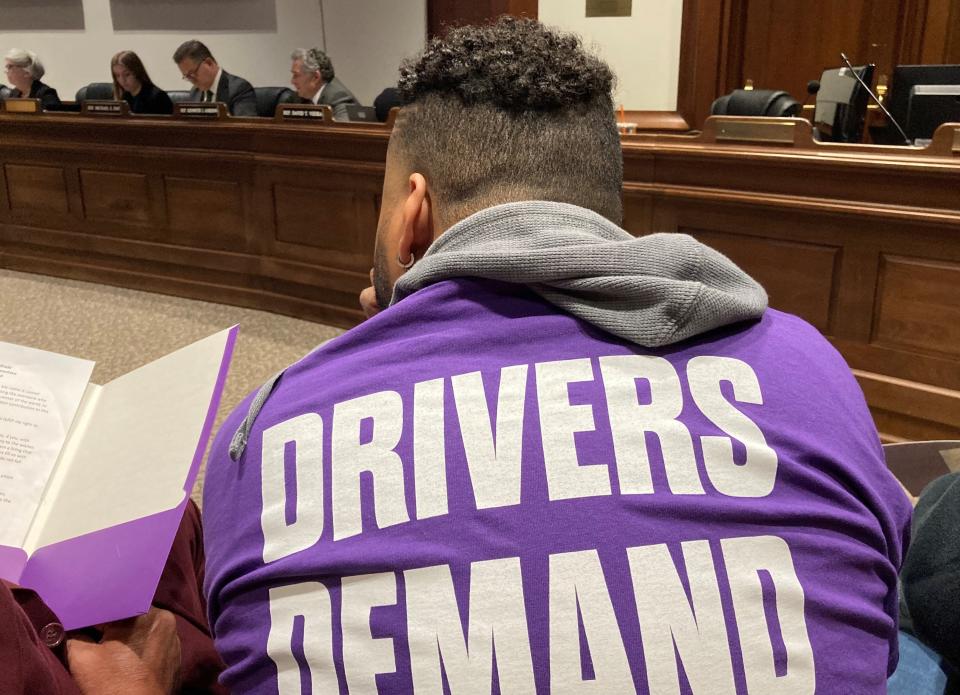Ballot questions could decide employment status for rideshare workers in Mass.
- Oops!Something went wrong.Please try again later.
BOSTON — Regulating the rideshare industry and network-based employment models may come down to which of the proposed ballot initiatives Massachusetts voters decide to endorse on their November ballots.

A special bicameral committee of lawmakers meeting for hours Tuesday heard the pros and cons of the ballot initiatives, now numbering six with different yet related questions. One initiative would create a pathway for the app-based workers to unionize. Five other measures that proponents promise will be merged into one by fall would determine their status as either independent contractors or employees.
Legislators have until the first Wednesday in May to act on the questions. They can either pass a ballot initiative, offer a suggested replacement or fail to act. If they do nothing, proponents will have to collect 12,429 new signatures for it to be placed on the November ballot.
Flexible work schedules or workplace securities?
The issue is posed as a choice between the benefits of flexibility in scheduling work hours, work schedules and the ability to opt out of a job at a moment’s notice against the security of workplace protections that include earning a minimum wage, accrued sick time, access to health insurance, workers’ compensation and unemployment benefits.
“I think the issue of flexibility is a red herring,” said Sen. Paul Feeney, D-Foxborough, suggesting the Legislature could codify flexibility into the laws pertaining to rideshare workers and determine they are employees. “Why are they mutually exclusive?”
Supporters of the path to unionization decline to address the question of employment status, instead focusing on allowing workers to bargain for wages, benefits and rights. One of the complaints of many drivers is that the app company can cut off their access to the dispatching network, locking them out of work and their ability to earn a living. It is supported by Local 32BJ of the Service Employees International Union and other labor organizations.
The five-question position is backed by the rideshare companies. Representatives from Uber, Lyft, DoorDash and Instacart appeared before the committee to emphasize that if drivers are folded into the Massachusetts workforce they could lose the flexibility that they value.
Massachusetts lawmakers, however, asked several times whether the move was just the latest plow to “avoid Massachusetts wage laws,” said Rep. Michael Day, D-Stoneham.
What is state's ABC test for employee classifications?
Classification of employees in Massachusetts is conducted under strict guidelines known as the ABC test. To be classified as an independent contractor, the worker must meet this criteria:
Is the work done without being under the direct control of the employer?
Is the work being done outside the usual course of the employer’s business?
Is the work being performed by an individual who has a business or trade that performs the specific function?
In discussing the ABC test, Feeney asked whether drivers set their own rates for rides. He also asked who determines the rate of compensation, noting that drivers with newer, more expensive vehicles are classified and compensated differently that those driving vehicles not considered luxury cars. In declining fares, Feeney asked whether any driver was deactivated or locked out of the app for declining fares.

He was assured by industry representatives that it had never happened “as far as they knew.”
The assertation drew a gasp from the audience and many shakes of their heads — many of the people packing the hearing room Tuesday were rideshare drivers. Deactivation shuts drivers out of work, impacting their financial status and could result in loss of income, repossession of vehicles and even homelessness.
In 2020, then-Attorney General Maura T. Healey filed suit against the app-based companies contending they had misidentified drivers as independent contractors instead of employees. If the state prevails in its suit, it intends to pursue all the accrued pay and benefits that have been withheld from the drivers.
“That sum is quite large,” said Pat Moore, first assistant attorney general in Andrea Campbell’s office in discussing the lawsuit. He refrained from discussing it in depth citing the pending litigation.
According to a spokesperson from the AG’s office, the status of the case is active. “We are preparing for trial, scheduled to begin on May 13. This will be heard in the Business Litigation Session of the Suffolk Superior Court.”
A separate suit filed earlier in the year questions the constitutionality of the five initiative questions. The suit, filed by six state residents, argue that the petitions violate Article 48 of the Massachusetts Constitution. That measure requires they pass the “Relatedness Requirement”: All provisions included in a question must be “related” and/or mutually dependent and addressing the same public policies. In the suit, they claim the initiatives propose an array of unrelated provisions that directly violate Article 48 and would affect the state’s employment and social benefits laws beyond the scope of question of drivers’ status.
Uber paid NJ $100M in back taxes, fines
New Jersey accepted a $100 million payout from Uber in 2022 in back taxes and fines after finding the company had misclassified its drivers as independent contractors over a four-year period. Currently, the Massachusetts state auditor is investigating the effects of the employment classification on Massachusetts’ finances, especially its unemployment insurance funds.
In his remarks, Moore listed the similarities and differences between the five related questions.
If approved by voters, the merged measure would unequivocally set driver status as independent workers. It would also offer a minimum wage 125% of the state minimum while they were engaged in a transport, 28 cents a mile driven while engaged with a transport, a stipend to access health care insurance based on hours driven and paid accrued sick time as mandated by Massachusetts law.
Brendan Joyce, public policy manager for Lyft in the Northeast, assured legislators that the company is committed to transparency. The company has just launched a direct appeal process to adjudicate deactivations.
“Riders are hearing back from companies within 24 hours; it’s a problem we are committing to fix,” Joyce said. The company has also issued fare guidelines, offering 70% to 85% of fares after taxes and fees that would be directed to drivers.
The backers of the initiative that would classify drivers as independent contractors, Massachusetts Coalition for Independent Work, launched a similar initiative proposed for the 2022 ballot. That initiative was declared unconstitutional on the relatedness measure.
California voters recently passed Prop. 22, classifying drivers as independent contractors. The executive director of SEIU California, Tia Orr, who appeared Tuesday before the legislators, said that drivers have not benefited from the measure.
Tech spent $220M in Calif. to defeat law
The technology companies spent $220 million on the campaign, Orr said.
“I wish I could say that drivers' lives are better, but they have not seen any benefits from Prop. 22,” Orr said.
Sen. Jason Lewis, D-Winchester, speculated that the well-being of drivers is not the reason the app companies spent $220 million to change laws in California.
“And are holding a gun to our heads in Massachusetts to go to a ballot question,” Lewis said. “It’s not about their professed care for drivers, rather it’s about the bottom line.”

Legislators wondered why, if the companies were willing to extend those benefits that would be mandated through a ballot initiative, couldn’t they make those changes now without the need to put the question to Massachusetts voters.
“I don’t trust you,” said Sen. Cindy Freidman, D-Arlington, suggesting recent changes in the relationship between the companies and its drivers were the result of intense scrutiny rather than a concern for their well-being. She asked what protections and assurances the companies offer to ensure the promises they are making on the ballot measure will be met and not leave it up to the state to shoulder the responsibility of providing for their workers.
This article originally appeared on Telegram & Gazette: Ballot questions could decide employment status for gig workers

